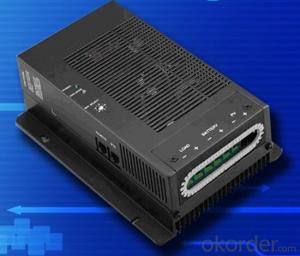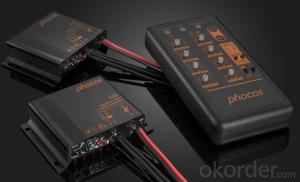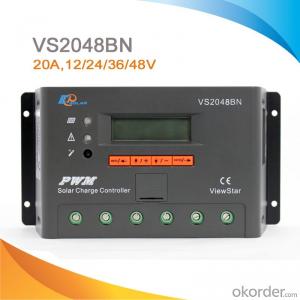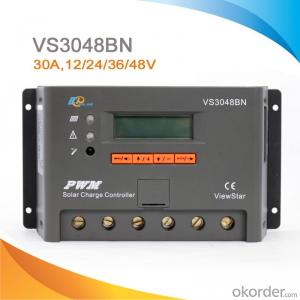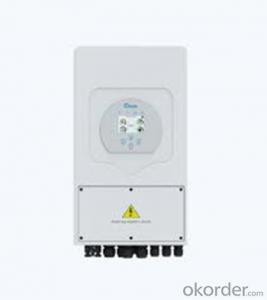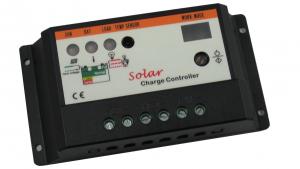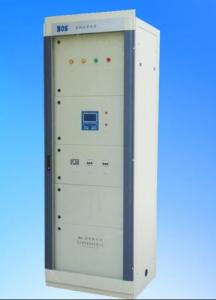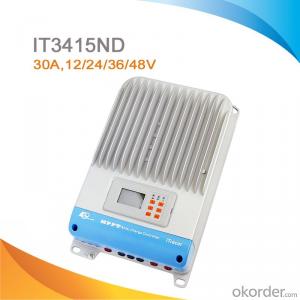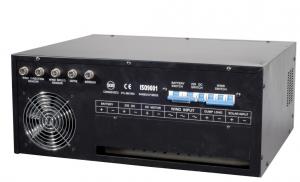Solar Charge Controller 12/24v Model SL-40A MPPT
- Loading Port:
- Shekou
- Payment Terms:
- TT OR LC
- Min Order Qty:
- 20 pc
- Supply Capability:
- 300 pc/month
OKorder Service Pledge
OKorder Financial Service
You Might Also Like
1. Structure of Solar Charge Controller 12/24v Model SL-40A MPPT
Solar charge controller 12/24V Model SL-40A MPPT adopts advanced MCU microprocessor control technology and MPPT technology. And 12V/24V can detect by itself to choose output voltage. It is mainly used for solar power station, home solar power system, solar street light control system,mobile solar system.
2. Main Features of Solar Charge Controller 12/24v Model SL-40A MPPT
High converting efficiency higher than 97%for minimizing energy loss
Build-in MPPT tracker for optimizing the power transformation
Reversed current protection for preventing equipment damage
Automatic battery temperature compensation for long-term reliability
Capable of selecting different charging mode for various type of batteries
Capable of connecting additional DC load for wider applications
Three stage charge control system(bulk,absorption, and float mode)with temperaturecompensation
LED indicators display charge status in real time
Pulse width modulation(PWM)topology combined with a multi-stage charge control algorithm leads to superior charging and enhanced batteryperformance
3. Solar Charge Controller 12/24v Model SL-40A MPPT Images
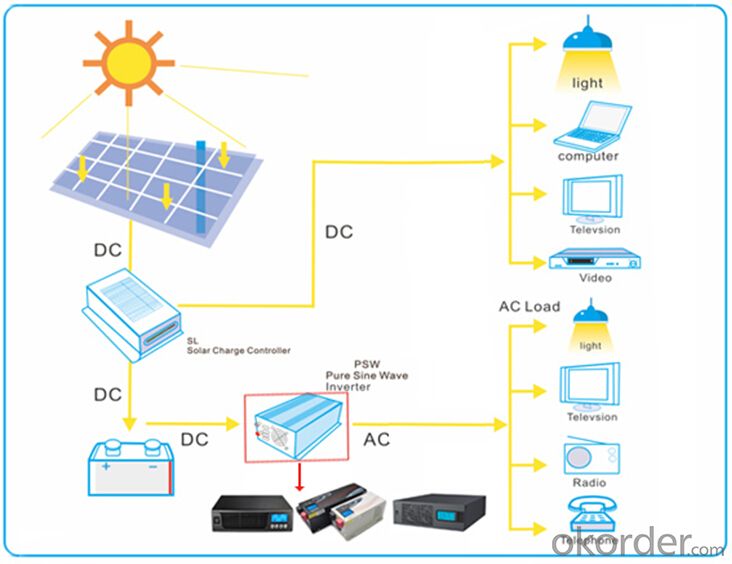
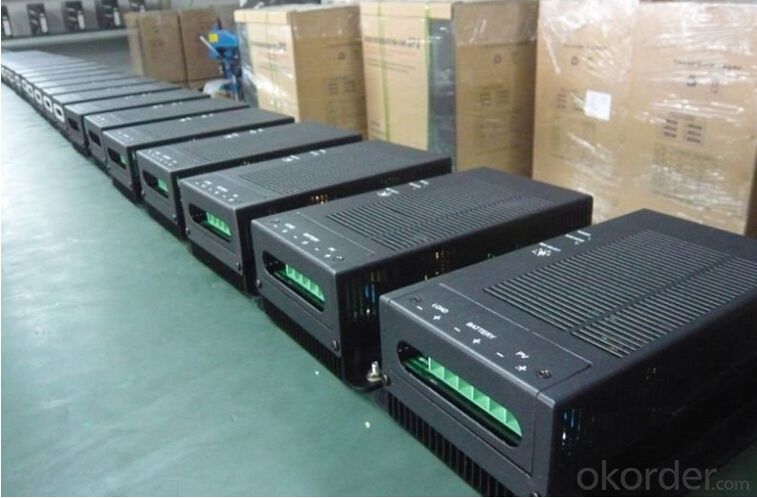
4. Solar Charge Controller 12/24v Model SL-40A MPPT Specification
| MODEL | SL-40A | |
| Rated Voltage | 12/24VDC | |
| Rated charge current | 40A | |
| Load current | 15A | |
| Input voltage rang | 15-55VDC | |
Max.PV open circuit array voltage | 55VD | |
| Typical idle consumption | <10mA | |
Overload protection (DC load) | 2.0*inom>5s 1.5*inom>20s 1.25*inom temperature controlled | |
| Bulk charge | 14.6V (default) | 29.2V (default) |
| Floating charge | 13.4V (default) | 26.8V (default) |
| Equalization charge | 14.0V (default) | 28.0V (default) |
| Over charge disconnection | 14.8V | 29.6V |
| Over charge recovery | 13.6V | 27.2V |
| Over discharge disconnection | 10.8V(default) | 21.6V(default) |
| Over discharge reconnection | 12.3V | 24.6V |
| Temperature compensation | -13.2mv/C | -26.4mv/C |
| Lead acid battery setting | Adjustable | |
| Nicad battery setting | Adjustable | |
Load control mode
| 1. Low Voltage Reconnect (LVR): Adjustable 2. Low Voltage Disconnect (LVR): Automatic Disconnection 3.Reconnection:Includes warning flash before disconnect and reconnect | |
| Low voltage reconnect | 12.0-14.0Vdc | 24.0-28.0Vdc |
| Low voltage disconnect | 10.5-12.5Vdc | 21.0-25.0Vdc |
| Ambient temperature | 0-40C (full load) 40-0C (de-rating) | |
| Altitude | Operating 5000m,Non-operating 16000m | |
| Protection class | IP21 | |
| Battery temperature sensor | BTS optional remote batter temperature sensor for increased charging precision | |
5. FAQ
Q1: How long do you need to prepare mass production?
Re: Normally we need 10-18days to finish the production, but it depends on the quantity of purchase order.
Q2: What kind of payment terms do you prefer?
Re: We prefer bank transfer or L/C,
- Q:Can a solar controller be used with a solar-powered research facility?
- Yes, a solar controller can be used with a solar-powered research facility. A solar controller helps regulate and optimize the charging process of solar panels, ensuring effective utilization of solar energy and extending the battery life. It also helps protect the batteries from overcharging or discharging. In a solar-powered research facility, a solar controller would be crucial in managing and maintaining the efficiency and reliability of the solar power system.
- Q:Can a solar controller be used with a battery backup system?
- Yes, a solar controller can be used with a battery backup system. A solar controller is responsible for regulating the charge from solar panels to the battery, and it can also manage the discharge from the battery to power various devices. Therefore, it plays a crucial role in ensuring the efficient and safe operation of a battery backup system.
- Q:Can a solar controller be used with solar-powered ventilation systems?
- Yes, a solar controller can be used with solar-powered ventilation systems. A solar controller helps regulate the charging and discharging of batteries in solar systems, ensuring optimal performance and preventing damage. It can be used to control the power supply to solar-powered ventilation systems, ensuring they operate efficiently and effectively.
- Q:Can a solar controller be used with a solar microinverter system?
- No, a solar controller cannot be used with a solar microinverter system. Solar microinverters are designed to convert the DC power generated by individual solar panels into AC power directly at the panel level, whereas a solar controller is used to regulate and control the charging of batteries in a solar system. These two components serve different purposes and are not compatible with each other.
- Q:Can a solar controller be used with a solar battery charging system?
- Yes, a solar controller can be used with a solar battery charging system. A solar controller is an essential component in regulating the flow of electricity from the solar panels to the batteries. It helps prevent overcharging and damage to the batteries by controlling the voltage and current. Therefore, using a solar controller with a solar battery charging system is crucial for efficient and safe operation.
- Q:How does a solar controller handle variations in load power requirements?
- A solar controller handles variations in load power requirements by constantly monitoring the power output from the solar panels and adjusting the charging current accordingly. When the load power requirement increases, the solar controller increases the charging current to meet the demand. Similarly, if the load power requirement decreases, the solar controller reduces the charging current to prevent overcharging. This dynamic adjustment ensures that the load power requirements are met efficiently while maintaining the optimal charging conditions for the batteries.
- Q:How does a solar controller handle load control for powering other devices?
- A solar controller manages load control by regulating the flow of electricity from the solar panels to power other devices. It ensures that the power generated by the panels is distributed efficiently and effectively to meet the energy demands of the connected devices, while also protecting the battery bank from overcharging or discharging. The controller monitors the battery voltage and adjusts the charge/discharge cycle accordingly, ensuring optimal utilization of the available solar energy while preventing any damage to the system.
- Q:Can a solar controller be connected to multiple solar panels?
- Yes, a solar controller can be connected to multiple solar panels. The purpose of a solar controller is to regulate and manage the charging process of the solar panels, ensuring optimal performance and preventing overcharging. Connecting multiple solar panels to a solar controller allows for efficient utilization of the solar energy generated by the panels.
- Q:How do you determine the charging parameters for a solar controller?
- To determine the charging parameters for a solar controller, several factors need to be considered. These factors include the type and capacity of the batteries being charged, the maximum input voltage and current of the solar panels, the desired charging efficiency, and any specific requirements or limitations of the solar controller itself. It is important to consult the manufacturer's guidelines and specifications for both the solar panels and the solar controller to ensure compatibility and optimal charging performance. Additionally, monitoring the battery's state of charge and adjusting the charging parameters accordingly can help maximize the lifespan and performance of the battery system.
- Q:Can a solar controller be used with solar-powered waste management systems?
- Solar-powered waste management systems can indeed utilize a solar controller. This controller, a vital component of any solar power system, is responsible for regulating the voltage and current levels of the solar panels. Its main purpose is to ensure optimal charging of the batteries and protection against any potential damage. In the context of solar-powered waste management systems, the solar controller would play a vital role in managing the charging process of the batteries that power the entire system. Its functions would include monitoring the output of the solar panels, controlling the flow of electricity to the batteries, preventing overcharging or deep discharging, and maximizing the efficiency and lifespan of the batteries. By effectively utilizing solar energy, this guarantees that the waste management system operates reliably and efficiently.
1. Manufacturer Overview |
|
|---|---|
| Location | |
| Year Established | |
| Annual Output Value | |
| Main Markets | |
| Company Certifications | |
2. Manufacturer Certificates |
|
|---|---|
| a) Certification Name | |
| Range | |
| Reference | |
| Validity Period | |
3. Manufacturer Capability |
|
|---|---|
| a)Trade Capacity | |
| Nearest Port | |
| Export Percentage | |
| No.of Employees in Trade Department | |
| Language Spoken: | |
| b)Factory Information | |
| Factory Size: | |
| No. of Production Lines | |
| Contract Manufacturing | |
| Product Price Range | |
Send your message to us
Solar Charge Controller 12/24v Model SL-40A MPPT
- Loading Port:
- Shekou
- Payment Terms:
- TT OR LC
- Min Order Qty:
- 20 pc
- Supply Capability:
- 300 pc/month
OKorder Service Pledge
OKorder Financial Service
Similar products
New products
Hot products
Hot Searches
Related keywords
